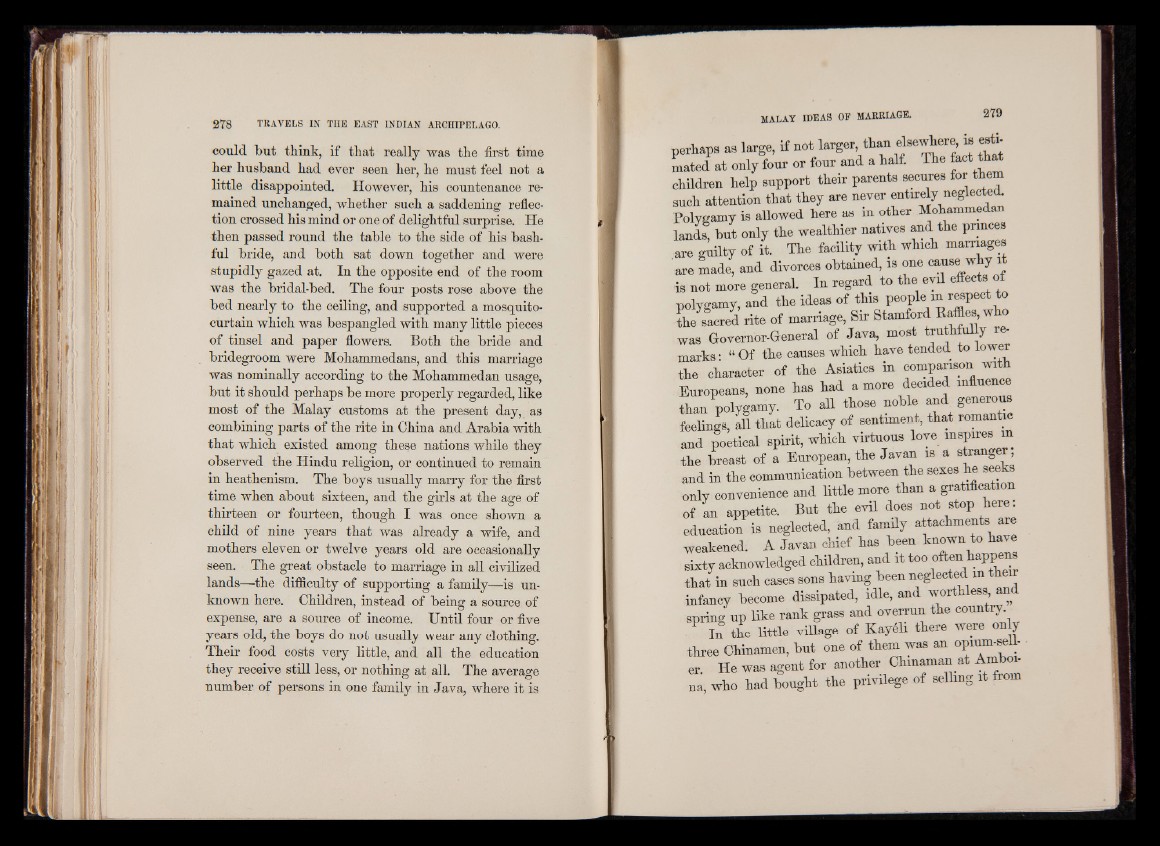
could but think, if that really was the first time
her husband had ever seen her, he must feel not a
little disappointed. However, his countenance remained
unchanged, whether such a saddening reflection
crossed his mind or one of delightful surprise. He
then passed round the table to the side of his bashful
bride, and both sat down together and were
stupidly gazed at. In the opposite end of the room
was the bridal-bed. The four posts rose above the
bed nearly to the ceiling, and supported a mosquito-
curtain which was bespangled with many little pieces
of tinsel and paper flowers. Both the bride and
bridegroom were Mohammedans, and this marriage
was nominally according to the Mohammedan usage,
but it should perhaps be more properly regarded, like
most of the Malay customs at the present day, as
combining parts of the rite in China and Arabia with
that which existed among these nations while they
observed the Hindu religion, or continued to remain
in heathenism. The boys usually marry for the first
time when about sixteen, and the > og irls at the aoge of
thirteen or fourteen, though I was once shown a
child of nine years that was already a wife, and
mothers eleven or twelve years old are occasionally
seen. The great obstacle to marriage in all civilized
lands—the difficulty of supporting a family—is unknown
here. Children, instead of being a source of
expense, are a source of income. Until four or five
years old, the boys do not usually wear any clothing.
Their food costs very little, and all the education
they receive still less, or nothing at all. The average
number of persons in one family in Java, where it is
perhaps as large, if not larger, than elsewhere, is esti-
mated at only four or four and a half. The fact that
children help support their parents secures for them
such attention that they are never entirely neglected.
Polygamy is allowed here as in other Mohammedan
lands, but only the wealthier natives and the princes
are guilty of it. The facility with which marriages
are made, and divorces obtained, is one cause why it
is not more general. In regard to the evil effects of
polygamy, and the ideas of this people m respect to
the sacred rite of marriage, Sir Stamford Raffles wh
was Governor-General of Java, most truthfully remarks
* I Of the causes which have tended to lower
the character of the Asiatics in comparison with
Europeans, none has had a more decided influence
than polygamy. To all those noble and generous
feelings, all that delicacy of sentiment, that romantic
and poetical spirit, which virtuous love inspires in
the breast of a European, the Javan is a stranger,
and in the communication between the sexes he seeks
only convenience and little more than a gratification
of an appetite. But the evil does not stop here:
education is neglected, and family attachments are
weakened. A Javan chief has been known to have
sixty acknowledged children, and it too often happens
that in such cases sons having been neglected in their
infancy become dissipated, idle, and worthless, and
spring up like rank grass and overrun the country
In the little village of Kayffli there were only
three Chinamen, but one of them was an opium-sell-
t t r \ w f o r another Chinaman at Amboi